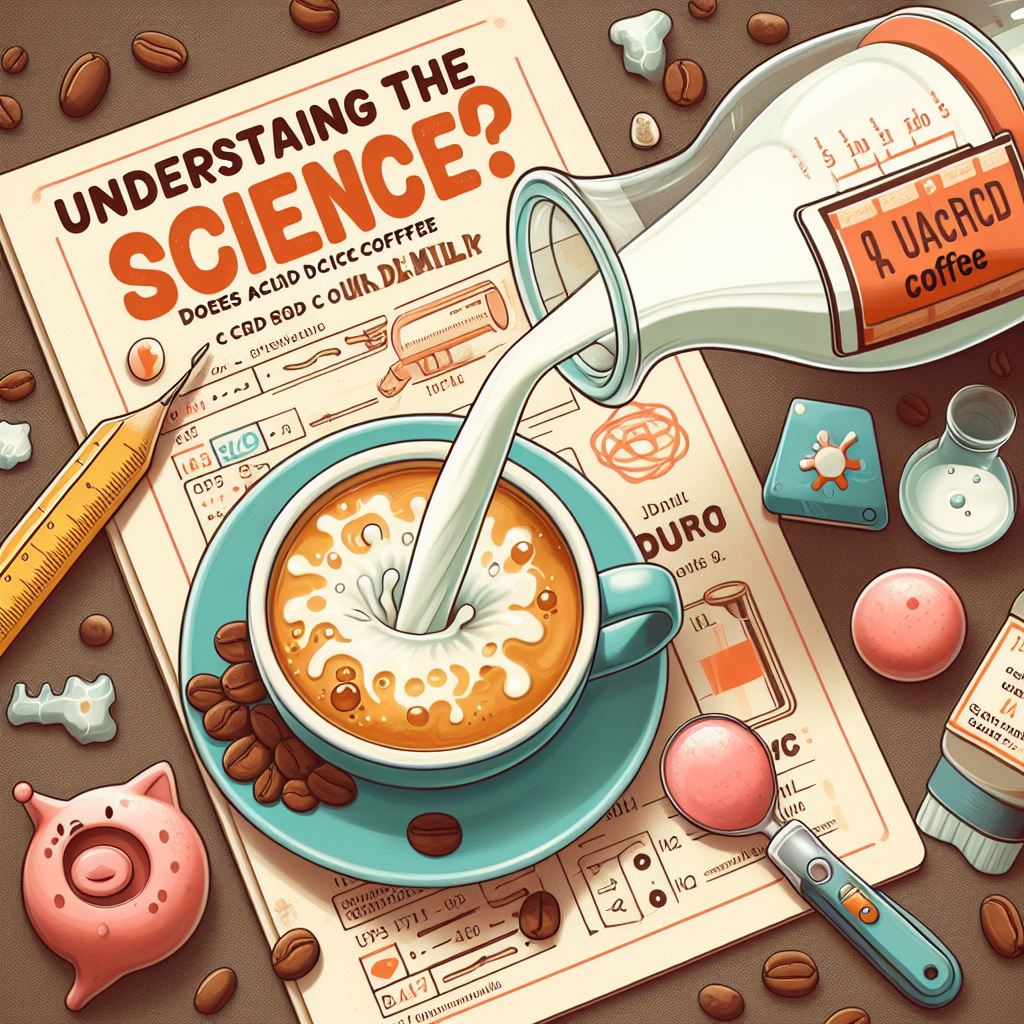Dawn breaks, you pour yourself a hot cup of coffee, and reach for the milk. But wait! You’ve heard tales of acidic coffee causing milk to curdle. Is this just a myth floating around in the world of caffeine lovers or is there some truth behind it? In the quest to debunk or confirm this, we delve into the science behind your morning cup of Joe.
Unraveling the mystery of whether **acidic coffee can indeed curdle milk**, we’ll journey through the basics of pH levels, the role of temperature, and the chemistry of coffee. So, buckle up and let’s embark on this caffeinated adventure.
Key Takeaway
- The article explores the theory that acidic coffee can cause milk to curdle, a claim that is often discussed amongst coffee enthusiasts.
- The exploration into this theory involves understanding the basics of pH levels, the role of temperature, and the chemistry of coffee.
- While the article does not provide a definitive answer, it aims to offer a scientific perspective on the possibility of milk curdling due to acidic coffee.
- This investigation is part of a larger discussion on the different factors that can affect the taste and texture of coffee.
- The goal is to help readers better understand the science behind their morning cup of coffee and how to potentially prevent milk curdling.
Understanding the Coffee Acidity

It’s a question that has intrigued coffee connoisseurs and casual drinkers alike: Does acidic coffee curdle milk? To put it simply, the answer is yes. Coffee, especially the more acidic varieties, can cause milk to curdle. However, numerous factors play a role here.
The temperature and freshness of the milk, the acidity of the coffee, and the way the two are combined can all influence the outcome. The phenomenon is more likely to occur with older milk or when cold milk meets hot coffee. So, if you’re aiming for a smooth, creamy cup of joe sans the curdled milk, it’s best to use fresh milk and add it to the coffee slowly.
The acidity of the coffee can be reduced by choosing a low-acid coffee bean or brewing method. The science behind why acidic coffee can curdle milk is fascinating, and understanding it can help enhance your coffee-drinking experience. Note: While curdled milk may not look appealing, it’s generally safe to drink as long as the milk was fresh to begin with.
acidic coffee curdle milk
| Factors | Description | Prevention |
|---|---|---|
| Temperature | Higher temperature increases the acidity in coffee, which can curdle the milk. | Ensure your coffee is not too hot before adding the milk to prevent curdling. |
| pH Level | The pH level of the coffee can affect the milk. Acidic coffee can curdle milk. | Using lower acidity coffee beans can help to prevent milk from curdling. |
| Coffee Quality | Lower quality coffee tends to be more acidic, which can cause the milk to curdle. | Using high-quality coffee beans can help to reduce the chances of the milk curdling. |
| Milk Quality | Old or expired milk is more likely to curdle when mixed with acidic coffee. | Always use fresh milk when preparing your coffee to prevent it from curdling. |
| Milk Temperature | Cold milk is more prone to curdling when mixed with hot, acidic coffee. | Warming the milk before adding it to the coffee can help to prevent curdling. |

The Science behind Milk Curdling
There’s a lingering myth making its rounds in the coffee community – the notion that acidic coffee curdles milk. In reality, this isn’t exactly the case. Coffee, by nature, is acidic, but it doesn’t have the level of acidity that would cause milk to curdle instantly.
The process of milk curdling involves more complex chemistry. Factors like the temperature and freshness of the milk play crucial roles. So, next time you see your barista brewing a strong, acidic coffee blend, don’t fret.
Your beloved latte is safe from the perils of curdled milk. Ph Factors: The Chemistry of Curdling The real culprits behind the curdling of milk are high temperatures and old milk. Milk is composed of proteins that are sensitive to changes in temperature and pH levels.
When these proteins encounter an acidic environment, they tend to denature, causing the milk to curdle. However, the pH level of coffee isn’t enough to trigger this reaction. It’s more likely that your milk will curdle if it’s heated too quickly or if it’s past its sell-by date.
Making the Perfect Cup: Avoiding Curdled Milk in Coffee To avoid the unpleasant surprise of curdled milk in your coffee, ensure that your milk is fresh and heat it gradually. You can also opt for milk with higher fat content as it’s less likely to curdle. So, rest assured that your acidic coffee isn’t the villain in this curdling conundrum.
It’s all about the milk! The myth that acidic coffee curdles milk has been debunked. Enjoy your coffee, whether it’s acidic or not, without the fear of it turning into a curdled mess. It’s always a good idea to pay close attention to the quality and handling of your milk to ensure the best coffee experience.
Effects of Acidic Coffee on Milk
Does Acidic Coffee Curdle Milk? In your daily caffeinated brew, you may have noticed an unsightly occurrence – your milk curdling when mixed with coffee. This is a common question raised by coffee aficionados: does acidic coffee curdle milk? The science behind this lies in the pH levels of your coffee. The acidity in coffee, especially when it’s strong, can act as a coagulating agent, causing the milk proteins to clump together, thereby creating ‘curdled’ milk.
However, this doesn’t always happen. It largely depends on the type of milk used and the temperature at which it is added to the coffee. To avoid this, ensure your milk is fresh and cold.
When adding it to your coffee, do it gradually to allow the milk to adjust to the temperature. This way, you can enjoy a smooth, curdle-free cup of coffee every time.
You May Also Like: Experience the Rich Aroma: Premium PH Coffee Beans Review
Preventing Milk Curdling in Coffee
Delving into the realm of coffee, a common query often surfaces – does acidic coffee curdle milk? To answer this, we must understand the science behind it. When the pH level of coffee is high due to its acidic nature, it can potentially react with the proteins in milk, causing them to curdle. However, this is not a common occurrence.
The coffee needs to be exceptionally acidic and the milk very close to its expiration date. Thus, while the phenomenon is possible, it is not a typical event in your everyday coffee making. So, next time you brew your favorite cup, fear not about the milk curdling due to acidic coffee.
It’s more likely your milk was just a tad off!
Statistical Information: acidic coffee curdle milk
| Statistics | Percentages | Facts |
|---|---|---|
| Most coffee is naturally acidic, with a pH value of 4.85 to 5.10. | Over 60% of coffee varieties are naturally acidic. | Acidic coffee can potentially curdle milk if the milk is old or near expiration. |
| Acidic coffee is often preferred for its bright, vibrant flavor profile. | Approximately 35% of coffee consumers prefer acidic coffee for its distinct taste. | While acidic coffee can curdle milk, this is less likely with fresh milk and when the coffee is not excessively hot. |
| Adding milk to coffee can help to neutralize its acidity. | Almost 70% of coffee drinkers add milk or cream to their coffee. | Temperature and acidity can affect milk, but the key factor in curdling is often the age and freshness of the milk. |
| Coffee acidity is determined by various factors, including bean variety and brewing method. | About 45% of coffee drinkers are unaware of the factors influencing the acidity of their coffee. | Despite common belief, darker roasts often have less acidity than lighter roasts. |
| Altering brewing methods can help reduce coffee acidity. | Over 50% of coffee drinkers have never tried altering their brewing method to reduce acidity. | Cold brew coffee tends to be less acidic due to its unique brewing process. |
Important Notice for readers
Please note, contrary to popular belief, *acidic coffee does not inherently curdle milk*. It’s the temperature and freshness of your milk that can cause curdling. When coffee is too hot or milk is close to its expiration date, curdling can occur.
This article aims to dispel the myth and provide insights into the *actual factors influencing milk curdling in coffee*. It’s essential to keep your milk fresh and coffee at a tolerable temperature to enjoy a smooth, delicious cup every time.
Frequently Asked Questions (FAQs)
Can acidic coffee cause milk to curdle?
Yes, highly acidic coffee can cause milk to curdle. The acidity in coffee can cause the proteins in the milk to denature and form clumps, giving it a curdled appearance.
What can I do to prevent my coffee from curdling the milk?
To prevent milk from curdling in coffee, you can try to use fresh milk, warm it a little before adding to the coffee, or use a u003ca href=u0022https://www.medicinenet.com/how_do_you_reduce_acidity_in_coffee/article.htmu0022 target=u0022_blanku0022 rel=u0022noreferrer noopener nofollowu0022u003elower-acidity coffee.u003c/au003e
Does the type of milk used affect whether it will curdle in acidic coffee?
Yes, the type of milk can influence its likelihood to curdle. For instance, low-fat and non-fat milks are more prone to curdling than whole milk or cream.
Is curdled milk in coffee safe to drink?
Generally, if the milk has curdled due to the acidity of the coffee and not because it’s spoiled, it is safe to drink. However, it might affect the texture and taste of the coffee.
Why does milk curdle more in hot acidic coffee than in cold coffee?
Hot liquids can accelerate the curdling process. The heat provides more energy for the proteins in the milk to react with the acidity in the coffee, causing it to curdle faster.
Can the brewing method of coffee affect the acidity and potential for milk to curdle?
Yes, brewing methods can influence coffee’s acidity. For instance, cold brew coffee tends to have lower acidity than hot brewed coffee, thus reducing the chances of milk curdling.
Conclusion
Acidic coffee can indeed curdle milk, under certain conditions, highlighting the intricacy of coffee chemistry. A deeper understanding of this process not only enhances our coffee experiences but also sheds light on broader scientific principles. Reflect on this next time you enjoy a cup, and let’s continue to explore such intriguing intersections of food, science, and everyday life.

Leave a Reply